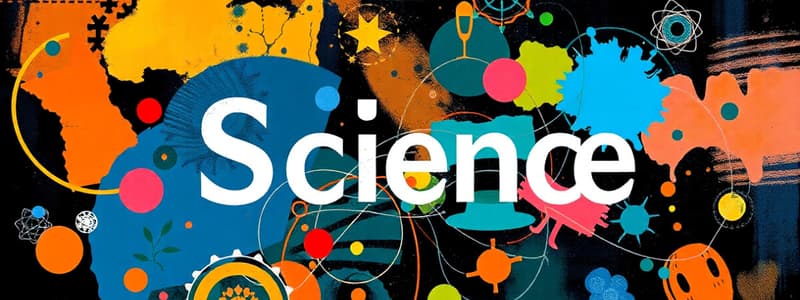Podcast
Questions and Answers
Which branch of science focuses on human behavior and societies?
Which branch of science focuses on human behavior and societies?
- Natural Sciences
- Formal Sciences
- Social Sciences (correct)
- Applied Sciences
What is the first step of the scientific method?
What is the first step of the scientific method?
- Analysis
- Observation (correct)
- Hypothesis
- Experimentation
Which of the following is NOT a characteristic of the natural sciences?
Which of the following is NOT a characteristic of the natural sciences?
- Application of mathematics (correct)
- Study of natural phenomena
- Study of matter and energy
- Study of living organisms
What defines a scientific theory?
What defines a scientific theory?
Which of the following is a key ethical consideration in science?
Which of the following is a key ethical consideration in science?
Which of the following statements about laws in science is true?
Which of the following statements about laws in science is true?
Which type of science primarily focuses on mathematical concepts?
Which type of science primarily focuses on mathematical concepts?
What is the main purpose of peer review in scientific research?
What is the main purpose of peer review in scientific research?
Which branch of science puts theoretical knowledge into practice?
Which branch of science puts theoretical knowledge into practice?
Which step in the scientific method follows experimentation?
Which step in the scientific method follows experimentation?
Flashcards are hidden until you start studying
Study Notes
Definition of Science
- Systematic enterprise that builds and organizes knowledge.
- Utilizes empirical evidence and testable explanations.
Branches of Science
-
Natural Sciences
- Study of natural phenomena.
- Includes:
- Physics: study of matter, energy, and forces.
- Chemistry: study of substances and their interactions.
- Biology: study of living organisms and ecosystems.
-
Formal Sciences
- Study of abstract concepts and logical reasoning.
- Includes:
- Mathematics: study of numbers, shapes, and patterns.
- Statistics: study of data collection and interpretation.
-
Social Sciences
- Study of human behavior and societies.
- Includes:
- Psychology: study of the mind and behavior.
- Sociology: study of social behavior and structures.
- Economics: study of production, distribution, and consumption.
-
Applied Sciences
- Application of scientific knowledge to practical problems.
- Includes:
- Engineering: application of science and mathematics to design and build.
- Medicine: study and practice of health care and clinical sciences.
Scientific Method
- Process for experimentation and problem-solving.
- Observation: Identifying a phenomenon or problem.
- Hypothesis: Formulating a testable explanation.
- Experimentation: Testing the hypothesis through controlled methods.
- Analysis: Interpreting data and determining if it supports the hypothesis.
- Conclusion: Drawing conclusions based on analysis; may lead to further hypotheses.
Importance of Science
- Drives innovation and technology.
- Contributes to improved quality of life.
- Enhances understanding of the natural world.
- Informs policy decisions and promotes sustainability.
Key Concepts
- Theory: A well-substantiated explanation of aspects of the natural world.
- Law: Descriptive generalizations about how the universe behaves under certain conditions.
- Peer Review: Evaluation process of scientific work by experts in the field.
Ethical Considerations in Science
- Honesty in research and reporting.
- Care in conducting experiments, particularly involving humans and animals.
- Importance of reproducibility and transparency in methods and findings.
Definition of Science
- Science is a systematic way of gaining and organizing knowledge about the natural world.
- It uses empirical evidence, meaning observations and experiments, to create testable explanations.
Branches of Science
- Natural Sciences focus on the study of the physical world, including:
- Physics: investigates matter, energy, and forces.
- Chemistry: studies substances and their interactions.
- Biology: studies living organisms and their ecosystems.
- Formal Sciences deal with abstract concepts and logical reasoning, like:
- Mathematics: explores numbers, shapes, and patterns.
- Statistics: analyzes data collection and interpretation.
- Social Sciences focus on human behavior and societies:
- Psychology: investigates the mind and behavior.
- Sociology: studies social behavior and structures.
- Economics: analyzes production, distribution, and consumption.
- Applied Sciences use scientific knowledge to solve practical problems:
- Engineering: applies science and mathematics to design and build systems.
- Medicine: studies and practices healthcare and clinical sciences.
Scientific Method
- The scientific method is a systematic process for experimentation and problem-solving.
- It involves these steps:
- Observation: Identifying a phenomenon or problem.
- Hypothesis: Forming a testable explanation for the observation.
- Experimentation: Using controlled methods to test the hypothesis.
- Analysis: Interpreting the collected data and determining if it supports the hypothesis.
- Conclusion: Drawing conclusions based on the analysis. This can lead to further hypotheses.
Importance of Science
- Science drives innovation and technological advancements, leading to improved quality of life.
- It helps us understand the natural world and its processes.
- It informs policy decisions and promotes sustainable practices.
Key Concepts
- Theory: A well-supported explanation of aspects of the natural world, based on extensive evidence.
- Law: A descriptive generalization about how the universe behaves under certain conditions.
- Peer Review: A process where scientific work is evaluated by other experts in the field to ensure quality and accuracy.
Ethical Considerations in Science
- Research and reporting must be honest.
- Experiments, especially those involving humans or animals, must be conducted with care.
- Transparency and reproducibility are crucial for scientific methods and findings.
Studying That Suits You
Use AI to generate personalized quizzes and flashcards to suit your learning preferences.




